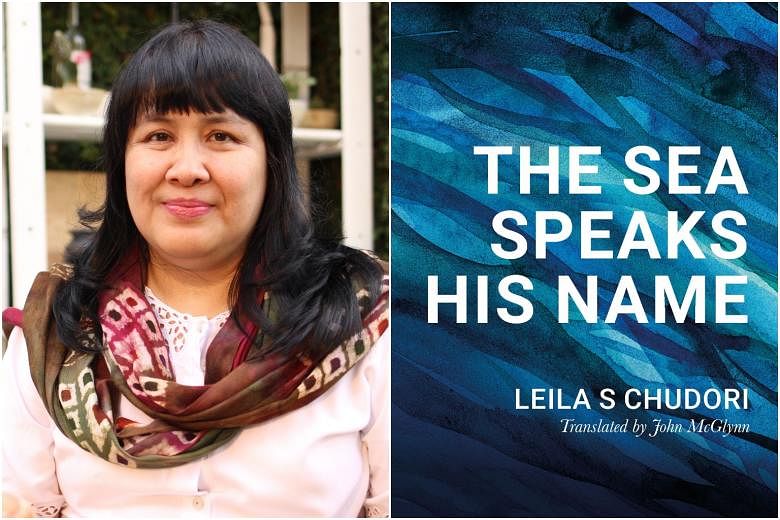SINGAPORE - In the two years after his disappearance, the family of kidnapped student activist Biru Laut continue to lay his place at the table every Sunday. They play the record of his favourite song, Blackbird by The Beatles, and wait for him to come home.
Laut may be the fictional protagonist of Indonesian writer Leila S. Chudori's novel The Sea Speaks His Name, but what his family goes through is based on the real-life accounts of those whose children vanished into political detention in the 1990s, during the last days of President Suharto's regime.
Chudori, 57, won the South-east Asia Write Award for this novel, which was published in 2017 in Indonesian as Laut Bercerita.
It was brought out locally earlier this year by Penguin Random House South-east Asia in an English translation by John H. McGlynn.
"I'm very honoured," says Chudori of receiving the regional award, which has been presented annually since 1979 to leading poets and writers in the 10 Asean countries.
Chudori, the daughter of The Jakarta Post co-founder Muhammad Chudori, spent 28 years as a journalist at news magazine Tempo.
In 2008, the magazine was working on a special edition on the Suharto regime. Chudori asked journalist Nezar Patria, a survivor of the 1998 student abductions, to write an account of his own kidnapping, detention and torture at the hands of the authorities.
"He wrote the piece and it was beautiful," says Chudori over Skype from Jakarta. "It was really scary and touching and a lot of people just couldn't believe that that happened only so many years ago.
"I said to Nezar, 'Look, I want to write about this.' And he said, 'Yes, you should write it because I'm not sure that in 10 or 20 years, the government will ever find out what happened.' It was never clear, you know, what really happened."
Of the 23 activists who were kidnapped, only nine were released. One was found dead and the rest were never heard from again.
Chudori, who worked full-time as a journalist until her retirement in 2017, would spend her weekends doing research for The Sea Speaks His Name.
She interviewed survivors as well as the parents and siblings of those who had disappeared, many of whom continue to press the government for answers.
"It is really painful," she says, "because one by one, the parents have begun to pass away, not knowing what happened to their children, not able to bury them."
There were parents who would stand in front of the state palace every Thursday, asking what had happened to their child. One father did not want to close the door of his house in case his son came back.
She gave her protagonist the poetic name of Biru Laut, or "blue sea" in Bahasa Indonesia, partly because of the rumour that the missing students were at the bottom of the ocean.
The novel opens with Laut being executed and thrown into the sea. It then flashes back and forth through his life, from his childhood to how he came to join the student activists and his subsequent kidnapping and torture.
A second part is told from the perspective of his younger sister Asmara Jati, who, years later, continues to search for her brother.
The novel was adapted into a 30-minute short film by director Pritagita Arianegara in 2018.
Chudori started writing as a child and got her first work - a short story about a banana tree - published in a magazine at the age of 12.
She and curator Yudhi Soerjoatmodjo have a daughter, Rain Chudori-Soerjoatmodjo, 25.
She has followed in her mother's footsteps as a writer and had her first story published in The Jakarta Post when she was 14.
Chudori's own early stories tended to be about women or psychological family drama, but her work as a journalist shifted the focus of her fiction towards the political.
Her 2012 novel Pulang, later translated into English as Home, was about Indonesian political exiles forced abroad during the 1965 anti-communist purge, unable to return home for the rest of their lives.
She is now working on a sequel to Pulang, although given the depressing atmosphere of the Covid-19 pandemic, she has found herself juggling that with an "uplifting anthology of culinary stories".
"As a journalist, you write facts," she says. "Whereas in fiction, you start everything with a character, and then you build your character based on your imagination and your research. A lot of things that I couldn't write in journalism, I could write in my fiction."
• The Sea Speaks His Name ($26.64) is available at bit.ly/SeaSpeaksName_LC


